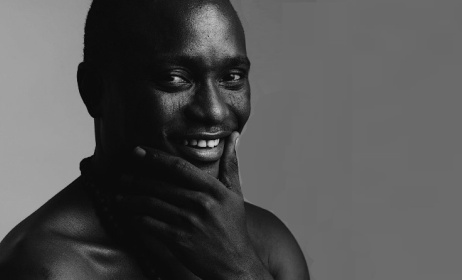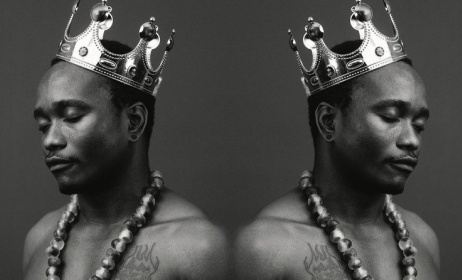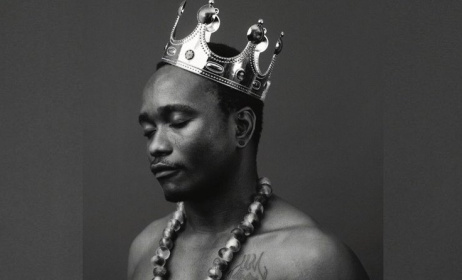Brymo — Tabula Rasa
 Brymo
Brymo Cover art for Brymo's Tabula Rasa
Cover art for Brymo's Tabula Rasa
If you are familiar with the lore surrounding the music of Nigerian artist Brymo you may think to sing is to brood to a beat. It is an image he has cultivated and in some ways encouraged. What with his clearly practised manner of tilting his syllables at an audible angle; that angle is visible when he performs live.
He takes off his shirt in live performances as well—where for other artists, it may be a projection of sex appeal, with Brymo it feels beyond; it seems to happen as a statement of his bare relationship to music. Even his decision to leave the record label Chocolate City came to seem like a declaration of independence that merges with his new music. Although that decision came with a court injunction barring the artist from releasing new music. it was lifted, leading to 2013’s Merchants, Dealers and Slaves.
Given the travails, you’ll expect more songs on the topic. (Perhaps that was taken off on MDS, where his first words were, “Truthfully, I’m feeling free.”)
Given the image, you’d expect his subsequent music to be filled with social concerns, to take a political mandate given to and claimed by the man himself on every song. You expect grimness. These are expectations Brymo deliciously dashes on his magnificent fourth album Tabula Rasa. Instead of ponderous music at every turn, we get the romp-tune ‘Fe Mi’—where sex is subject, where the human body seems assigned for pleasure and pleasuring. Where the cries are either ‘encore’—baby baby…that thing you do before I like the feeling—or demands for immediate gratification—fe mi! fe mi o! [Love me! love me!].
Elsewhere, there is sex as metaphor and not quite as: On ‘Prick no get Shoulder’, a title that translates to, the penis has no shoulder, the idea is caution not coitus. Not fully in any case. It is also about sexual caution. Be careful who you sleep with, he admonishes. Fair advice in these times. That the man takes pleasure from sex shouldn’t be news. When adults and adolescents showed up to record music, part of the impulse must have been seduction.
More surprising is how the album opens—with ‘Back to Love’ featuring a jumpy beat and whistling. In other words, a joyful tune, a song meant to be sung some evenings with many a finger snapping and head whirling somewhere in peaceful Lagos. The joyousness will show up again on ‘Jungle Fever’, with hand-claps. The picture on the latter is less savoury, however.
With 'Jungle Fever', the approach is similar to the afrobeat model of gritty realism set to a compulsively danceable tune, a pattern that perhaps reached the peak of both protest and dance on Femi Kuti’s popular 1998 track ‘Sorry, Sorry’. Like that song, Nigeria is the subject here, the country’s problems make up the content, as dissent and dissatisfaction are handed a dance-worthy backdrop. But Brymo isn’t as explicitly political as the Kutis. Where the afrobeat’s premier family are forceful, he is persuasive. He is a suggestive activist not a stridently sermonising one.
On ‘1 Pound’, which is both album and career highlight, the focus is geographically smaller: Lagos. Brymo gives a vital lesson: Any piece of music intending to capture Lagos must overuse the horn section. You know, just like the city's notorious traffic. The picture is recognisable for the average Lagos resident. There is the eternal violence of Lagos: the conductor and driver fight. There is the boy shouting “up NEPA”. There is someone else drinking 'pure water' [water in a transparent sachet sold cheaply across Nigeria].
The true topic, though, is the narrator and his city as he races to find a meal before meeting up a girl in the evening. In three minutes, Brymo deftly storifies Lagos—the city and the individual. Because this particular storyteller loves the city, even the small-time but no less violent confrontation of the bus conductor and driver receive an uncritical glance. This is perhaps the blind spot of Lagos residents who may decry the violence of public officers on national television but accept the smaller fights of the normal population. The question arises: Who becomes a public officer if not the regular citizen promoted by fate or funds?
“It gets dark and dark,” Brymo sings on album closer ‘Again’. His music, too, has gotten dark and dark. The man’s concerns are unrecognisable from the dude who came up, in 2007, singing a song titled ‘Shawdy’—a pop tune for a girl, lacking the soberness of ‘Again’ or the earnest ribaldry of ‘Fe Mi’. When he got a record deal with Chocolate City, his first single was ‘Ara’ (2011), a song made for the clubs. By his second, ‘Good Morning’ (2012), he seemed to be shifting from the clubs not quite to the bedroom but close enough to hint his companion and with enough indifference to deny his attempts at seduction. The tilting of syllables had begun to be apparent—looking back it appears the look of someone with a bitter-sweet substance in his mouth. The sweetness of a burgeoning fame and the bitterness of a man in the process of changing his mind. He is wearing a suit in that video but seems to want to burst out of it. After ‘Good Morning’, he would never look as comfortable singing a love song without a measure of soberness.
The transition has reflected in his c;lothing for his music videos: from the hoodie on 2010’s ‘Oleku’, the song that announced him officially to the Nigerian audience as ‘a killer hook’ singer to the suit on ‘Good Morning’ (2011) to the clingy, flimsy outfit on ‘Down’ from Merchants, Dealers & Slaves (2013). And then in the 2015 video for ‘1 Pound’, he seems to disappear, to fade into the city of Lagos.
That disappearance is important to Tabula Rasa. The phrase means a clean slate—a reference to the new life gained after the lifting of the legal restriction placed on his music by Chocolate City. Accordingly, the album is less about the singer’s image than about words (and music) about to go on that slate. And be it about sex or Lagos or the perennial problems of Nigeria, Brymo’s words on Tabula Rasa are thought-provoking and often thrilling. The production is just as good.
Two years are now past since Tabula Rasa's release and the word ‘classic’ is stuck to the record’s Wikipedia page. As time is the ultimate keeper of reputation, we’ll have to wait for it to decide. The odds, though, look super-bright for this record.
Brymo's new record Klitoris is out. Purchase on iTunes here



































Comments
Log in or register to post comments